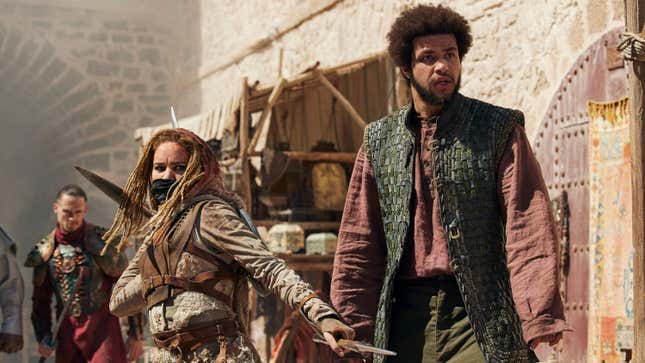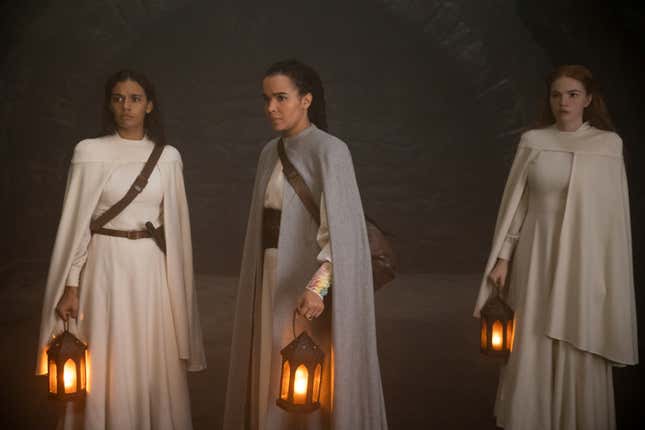
That Prime Video’s streaming adaptation of The Wheel Of Time, Robert Jordan’s 14-volume-deep series of high-fantasy novels, would occasionally deviate from the course the author set on the page was to be expected. Hell, it’s right there in the word: adaptation. Things would naturally have to be modified, merged, or magnified to fit the confines—artistic, technical, budgetary, and otherwise—of the screen. But it’s just how far the show veers from the source material, and heartily so, that makes the second season not only a vast improvement on the first, but also a solid argument that the wide, wonderful world of fantasy TV doesn’t always need to be so damn faithful.
The Rings Of Power, House Of The Dragon, The Witcher, Outlander, Shadow And Bone, His Dark Materials, Good Omens—nearly all the big-budget fantasy epics that have hit streaming of late have their roots in a beloved book series. And with adaptation comes expectation: Existing IP has the benefit of a built-in audience, sure, but it’s also inevitably limited in the liberties that audience will allow. What those rabid page turners often expect is the impossible: to have every character and castle and creature and quote play out as devotedly onscreen as they did in the adaptation that thus far only existed in their minds, fantasy in its most literal form. So streaming adaptations like The Wheel Of Time are unreasonably tasked with satisfying two audiences at once: appeasing the devout without alienating the uninitiated.
And in much of the series’ first season—an eight-episode stretch that ran in late 2021—showrunner Rafe Judkins and the writing staff seemed suitably concerned with fidelity, intently unpacking the denseness of Jordan’s expansive tomes (there’s also a prequel as well as two companion books) and earnestly presenting the customs and cultures of “The World of the Wheel.” As on the page, you found Moiraine (played by Rosamund Pike), a member of a powerful all-female organization known as the Aes Sedai, on a quest to narrow down which of five young villagers was the true Dragon Reborn, the prophesied hero that would overthrow the Dark One and restore the realm.
But season two’s many departures from the novels—some pragmatic, others merely cosmetic—prove that the powers that be are now using The Wheel Of Time as less of a rulebook and more of a reference. Just look at where we pick up with our less-than-merry band of travelers in the season premiere (the first three episodes hit Prime Video on September 1, with subsequent episodes airing weekly): The second novel kicks off with our fivesome together in the city of Fal Dara, but in the TV version, each character is on their own hero’s journey.

Egwene (Madeleine Madden) and Nynaeve (Zoë Robins) are training to become Aes Sedai at The White Tower, where, unbeknownst to them, their buddy Mat (Dónal Finn, taking over the role from Barney Harris, who departed the series after six episodes) is being held captive by Liandrin Sedai. Perrin (Marcus Rutherford) is hunting for the Horn of Valere alongside a gang of Shienarans. And Rand (Josha Stradowski)—who faked his own death in the season-one finale after the reveal that he is the Dragon Reborn—has been keeping it on the down-low in Cairhien, shacking up with an inn owner and working at the local sanitarium.
The decision for the group split was a practical one behind-the-scenes—Harris’ unexpected exit last season meant a major rewrite for Mat’s storyline—but also a beneficial one onscreen. Though Rand is the undisputed protagonist on the page, the great “champion of the Light” battling against the Dark One, the show graciously extends beyond his perspective to tap into the experiences and emotions of other characters, particularly the women, an upgrade considering the criticism of weak characterization last season.
Centering Moiraine as the entrypoint into the realm is a narrative no-brainer given how vital the Aes Sedai are to this world; it also doesn’t hurt that Rosamund Pike—here having to navigate not only the grief and confusion of Moiraine’s loss of power, but also its worrying ramifications in her bond with Lan (Daniel Henney)—is simply a far more compelling lead than Josha Stradowski, who still suffers from bouts of CW-style line delivery. The first four episodes of season two also give a greater spotlight for Robin’s Nynaeve, reactionary and defiant in her struggles to master the One Power, and Madden’s Egwene, insecure about her own abilities and vulnerable after seemingly losing Rand. The deeper insights into these women simply wouldn’t be possible if the show faithfully followed the Rand-led written tale.
Far less burdened with the busy work of world-building and the relentless rhythm of hitting familiar beats for fastidious readers, season two slows the wheel down, allowing for more human moments to pop in the midst of all the supernatural thrills. And along with giving those moments room to breathe, the expanded framework also allows space for storylines to branch off in unexpected ways, for fresh connections to form between characters who barely interact on the page. (The banter-fueled friendship between the roguish Mat and his cellmate Min this season is but one example.) The Wheel weaves as the Wheel wills, indeed.
The Wheel Of Time was renewed for a third season before the second even premiered, so how future episodes will further stretch from the story’s roots remains to be seen. But in leaving the obligations of the books behind—while still managing to find magic in the source material—season two has established the series as not just watchable TV, but good TV full-stop, proving that even a decades-old, pored-over tale still has the ability to surprise.